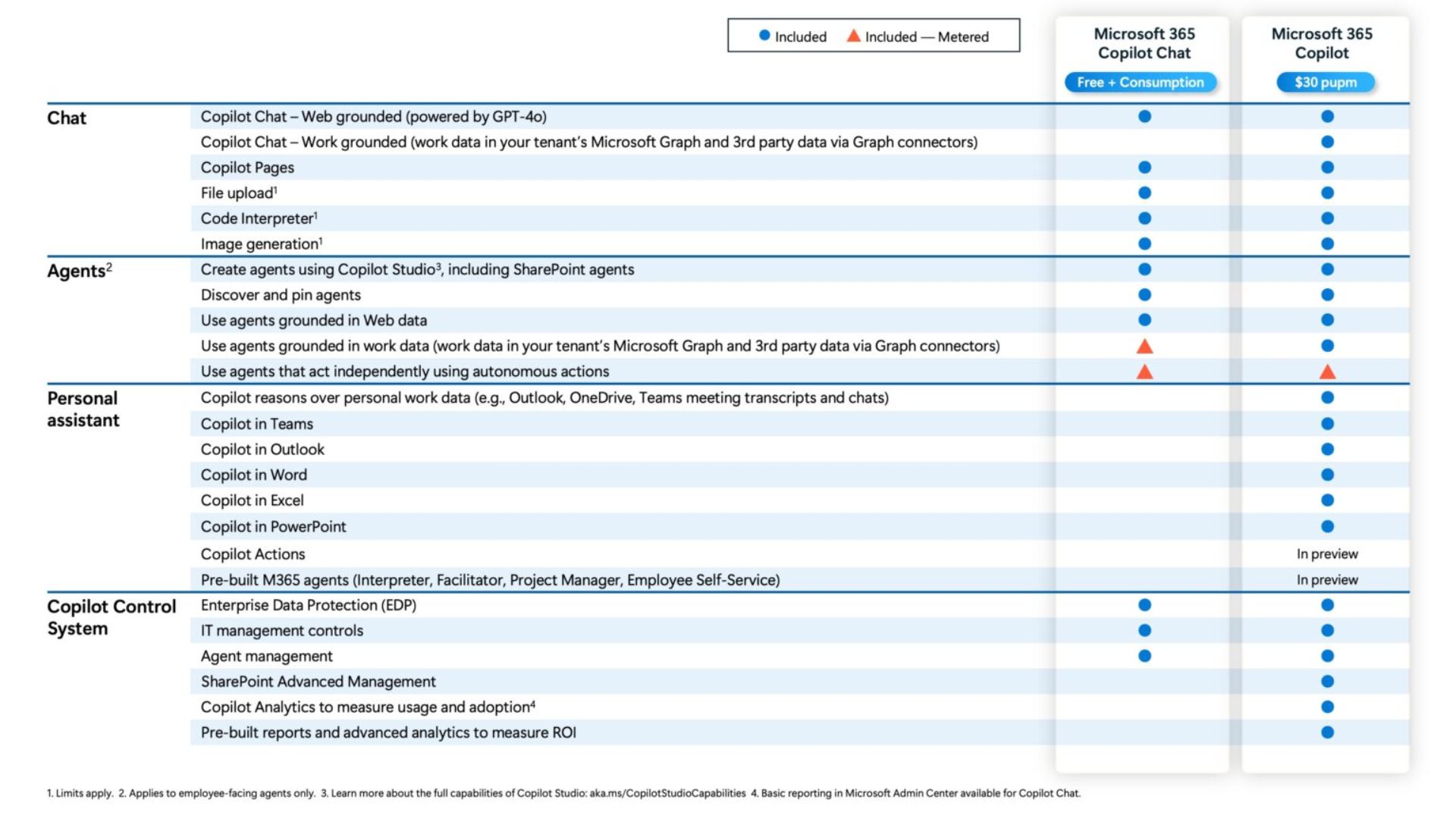Microsoft recently unveiled Copilot Chat — “a new offering that adds pay-as-you-go agents to our existing free chat experience for Microsoft 365 commercial customers.” The experience ships with several features, including OpenAI’s GPT-4o model to facilitate free and secure interactions with the AI-powered tool, Agents for automating repetitive tasks, and IT controls, including enterprise data protection and agent management.

As Microsoft’s Copilot branding gets even more complicated, it’s worth noting Microsoft 365 Copilot Chat is a relaunch of the tech giant’s free Copilot for businesses service. This could be a bold move by Microsoft, blatantly attempting to get more users to leverage its AI services. As you may know, the capability to create agents was exclusively limited to Microsoft’s 365 Copilot experience for $30/month.
While speaking to The Verge about Copilot Chat, Microsoft’s CMO of AI at work, Jared Spataro indicated:
“It’s free and secure AI chat that’s GPT-powered. You can upload fthey mustles so it’s very comparable to the competition, in fact we think even at this level it bests the competition.”
Directions On Microsoft’s Mary Jo Foley notes that the new offering will be available to users signed in with Entra ID accounts, similar to the approach used when accessing Copilot Chat’s predecessor, Bing Chat Enterprise. For context, Microsoft updated Bing Chat Enterprise to include Enterprise Data Protection (EDP), which adds prompt and response retention to ensure prompts are retained within the Microsoft 365 service boundary.
Users with Entra IDs can access Microsoft 365 Copilot Chat for free to create AI agents. However, they must set up Pay-As-You-Go licensing and leverage Copilot Studio metering in Azure to create agents.
But Copilot Chat’s pricing isn’t that simple
How does Copilot Studio metering work? The short answer: it’s complicated. According to Microsoft’s pricing and consumption rates, agent usage is measured in messages. For context, classic responses to queries that don’t leverage LLM smarts are categorized as one message while those that use advanced AI smarts will constitute two messages.
Interestingly, responses that depend on advanced models and potentially hit Microsoft Graph will constitute 30 messages. “A message is equivalent to 1 cent, so you can essentially convert it over to 1 cent, 2 cents, and 30 cents,” clarified Jared Spataro.
Microsoft’s CMO of AI, Jared Spataro, further broke down the service’s pricing model as follows:
“The first question people ask me is ‘am I writing you a blank check? The way you can control the spinning of the meters is paying in different ways. One way is pay-as-you-go, that is essentially an open account or tab that you’re burning down, but the other way to do it is through consumption packs, and when the pack runs out you’re done.”
While Microsoft claims approximately 70% of Fortune 500 employees are already on board the Copilot AI train, insiders have expressed alarming concerns, citing a premature launch that could potentially backfire with customers. Interestingly, Spataro claims Copilot Chat is already popular among organizations that leverage Microsoft’s services:
“We had Bing Chat Enterprise that we renamed, and despite the fact that the naming journey has been hard to track and it’s hard to find the product, we have a remarkable number of users on it. What we find is that when you start to use it, you become accustomed to and appreciative of the value that it can provide at work.”
Privacy and security remain a major concern for users despite Microsoft CEO Satya Nadella’s focus shift amid a cascade of security failures. According to a Microsoft employee, the tool “works really darn well at sharing information that the customer doesn’t want to share or didn’t think it had made available to its employee, such as salary info.”
READ MORE: Salesforce claims Microsoft repackaged OpenAI in Excel
User reception to Microsoft’s Copilot Chat entry and new pricing model remains unclear, as does whether it will drive more traffic to the tech giant’s AI business. A previous report from Business Insider revealed that Microsoft heavily relies on third-party vendors to make its AI apps work, including Microsoft 365 Copilot, prompting a high-ranking executive at Microsoft to claim that most Copilot AI tools are gimmicky.





